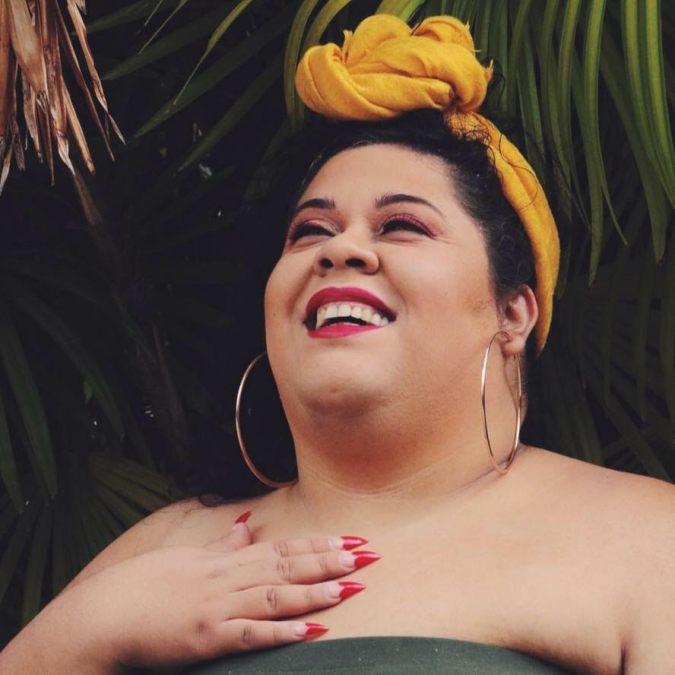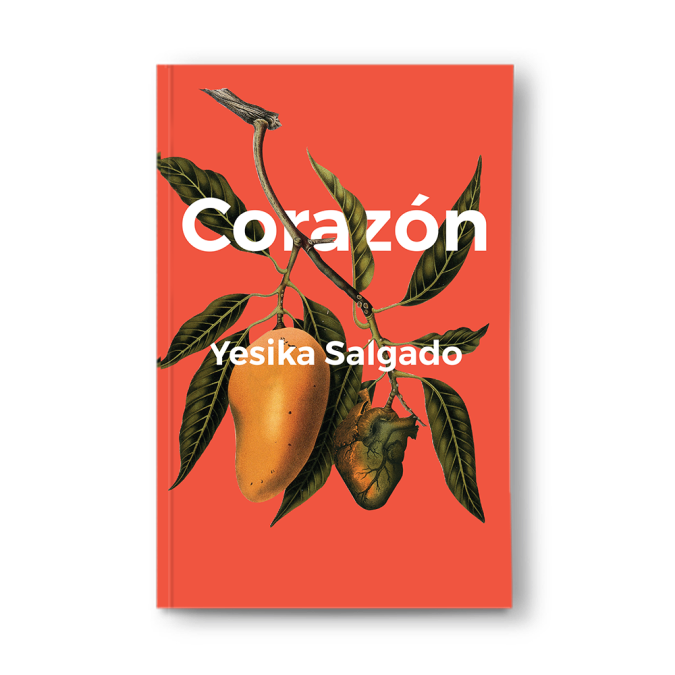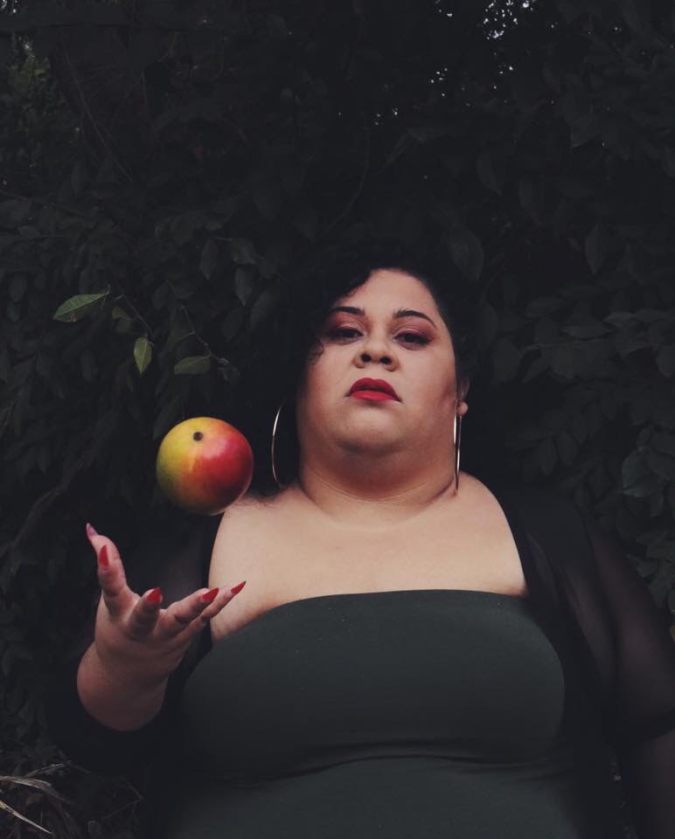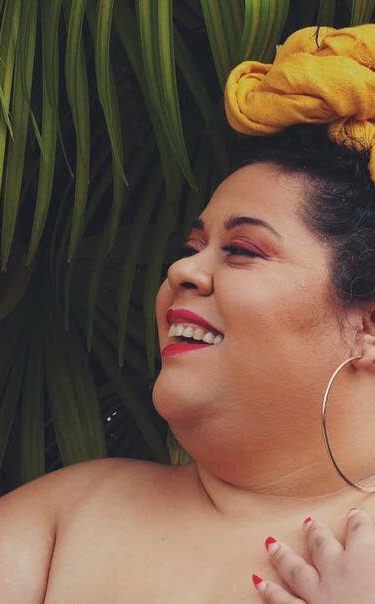Yesika Salgado is the picture of confidence. With her signature red lipstick, unapologetically bold fashion, and raw honesty, which peppers her debut book, the Salvadoran-American poet serves as an inspiration to her followers. But growing up, she never quite fit in, turning to books to escape the reality that she didn’t quite love and accept herself just as she was.
“I was always the sore thumb sticking out,” she tells me of her role as “la gordita” in her family.
Her self esteem only worsened with age as she hid behind the online personalities she created. She began sharing her poetry anonymously on HipHopPoetry.com and catfished men using fake photos. Then, she befriended a guy she liked and came clean after she continued to postpone their meetup.
His response changed everything.

“He asked me, ‘Why didn’t you give me the option to choose you for you? You chose for me,'” she remembers.
It was at that moment she realized she hated herself. “It’s such a weird notion and it shook me to my core,” says Salgado, who began to see a therapist after this incident. “I had a lot of medical issues that I finally had the courage to address and something in me woke up.”

She started wearing red lipstick and eventually switched out garb meant to disguise her for clothes that allowed her to shine. She, on the encouragement of Hip Hop Poetry’s founder, also began to share her poetry as Yesika. Soon, there was no stopping her. “I was in a place where I loved myself in a way I never had before,” Salgado says.
She had evolved from the friendly sidekick in others’ story to the leading lady in her own life, and it’s affected her work. Heartbreak and healing – and everything in between – make up the fabric of Yesika’s poetry. She still has her bad days – times people’s comments cut deeply – but she recovers through her words.
“I was in a place where I loved myself in a way I never had before.”
Her poetry is incredibly personal; she invites readers into moments that have defined her life. She’s written about the pain she endured after her father’s death, and any major breakup will eventually make its way into her work.
“We, Latinas, are really good at laughing at our tragedy and that’s what (gives me the courage) to share my heartache so freely,” she said.
Her debut book, Corazón, is already available at publisher Not a Cult Media’s website but will drop in March 2018 on Amazon. The poetry collection weaves together different types of love at various stages in life. “The yearning for love, falling in love, and falling out of love, and returning to yourself,” Salgado explains. Her connection with her father finds its way into the book, as does her perception of the relationship between her parents, who had to face his alcoholism. “His passing has really affected the way I love people and that’s referenced in the book,” she adds.

Exposing her vulnerability has resonated with her followers. On social media, people have shared touching messages about what her book has meant to them. “I tell people that poetry, at its core, is the constant reminder that we are not alone,” Salgado shares. “All of us seek poetry to tell us that someone else feels the way we do.”
The book’s name comes from the affectionate nickname her father gave her. “It was a word I associated with being loved, and I knew that was going to be the title of my first book,” Salgado says.
“Poetry, at its core, is the constant reminder that we are not alone.”
By the time she signed her contract with independent publishing company Not a Cult Media, Yesika’s body- and sex-positive words helped her make a name for herself on and offline. She was a member of Da Poetry Lounge, a Los Angeles institution that bills itself as the country’s largest weekly open mic. As she fulfilled weeks of speaking engagements, she furiously worked to submit her manuscript on deadline.
“The publishing house took a risk on me, and I took a risk on them, and it’s completely paid off,” she says.
For the book’s cover, an artist drew a single ripened mango on a branch with a leaf in the shape of a human heart. The background cover is in the blood orange color she requested. The poetry that fills the pages and the cover of the book was the perfect culmination of her life to this point.
“That cover influenced the name of the chapters and a lot of the poetry selection within the book,” she says. “I ended up thinking of my heart as this ripening fruit, and it became part of the story.”

The sweet fruit was fitting as Yesika references mangoes throughout her poetry. She recalls picking mangoes on her family’s property during childhood summers spent in El Salvador. To get to them, she had to cross a field of cows, which terrified her. One had kicked her before. If she made it across unscathed, she would reward the cows with mangoes. It was an act of bravery and love, as her book is now.
Yesika, who formed Chingona Fire, a feminist poetry collective with best friend Angela Aguirre, got her start by sharing her poems on Instagram. A few years ago, this life would have seemed impossible to Yesika. But her courageousness has pushed her out of her comfort zone. She quit her job at CVS Pharmacy a about a year ago. At the time, she had only saved enough to keep her afloat for three months. Schools quickly began to book her, allowing her to support herself merely through her art.
Now, her book is making waves. In the weeks it’s been available for pre-order, she’s sold 1,000 books, and it’s on Amazon’s best-seller lists, including women’s poetry titles and Hispanic American poetry titles, where she reached No. 1.
Yesika is already planning her next book. Now, books aren’t an escape from her life; instead, they’re a tool to help others heal. “If I make someone feel less alone and more seen and become more unapologetic and able to forgive themselves,” she says, “then I feel I’ve done my job as a writer.”




